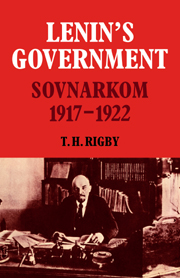Book contents
- Frontmatter
- Contents
- Tables
- Preface
- Acknowledgements
- Abbreviations
- Part One SMOLNY: SOVNARKOM TAKES SHAPE
- Part Two THE KREMLIN: SOVNARKOM IN ACTION
- 5 The move to Moscow
- 6 Sovnarkom in session
- 7 ‘The minute hand’
- 8 Sovnarkom's alter ego
- Part Three OF MEN AND INSTITUTIONS
- Appendix A
- Appendix B
- Notes
- Bibliography
- Index
- Plate section
- Frontmatter
- Contents
- Tables
- Preface
- Acknowledgements
- Abbreviations
- Part One SMOLNY: SOVNARKOM TAKES SHAPE
- Part Two THE KREMLIN: SOVNARKOM IN ACTION
- 5 The move to Moscow
- 6 Sovnarkom in session
- 7 ‘The minute hand’
- 8 Sovnarkom's alter ego
- Part Three OF MEN AND INSTITUTIONS
- Appendix A
- Appendix B
- Notes
- Bibliography
- Index
- Plate section
Summary
In the seventeen hectic weeks between the Bolshevik seizure of power and the transfer of the capital to Moscow, Sovnarkom had established itself as the chief decision-making body in the new Soviet state. True, there were other bodies with great power and authority. The Central Committee of the Bolshevik Party was the final arbiter of policy, and the Central Executive Committee of the All-Russian Congress of Soviets (the CEC) became the embodiment of the proclaimed sovereignty of the soviets. However, the party Central Committee had no effective executive machinery of its own and, while taking occasional decisions of key importance (like that on the Brest-Litovsk Treaty) it generally relied on its party comrades in Sovnarkom to translate the Bolshevik programme into concrete decisions and secure their implementation. As for the CEC, although it formally combined at the supreme level of authority both legislative and executive powers, as did the soviets at lower levels, it began very quickly to evolve into a quasi-parliamentary body. The CEC never became a true parliament, since paradoxically the very rejection of the ‘bourgeois’ doctrine of the division of powers, while giving it executive prerogatives which it was unable effectively to exercise, also allowed Sovnarkom to assert an independent legislative role which rendered ineffectual its formal responsibility to the CEC. Thus in the early period of the Soviet regime, Bolshevik rule meant, in institutional terms at least, Sovnarkom rule.
- Type
- Chapter
- Information
- Lenin's GovernmentSovnarkom 1917-1922, pp. 53 - 64Publisher: Cambridge University PressPrint publication year: 1979

